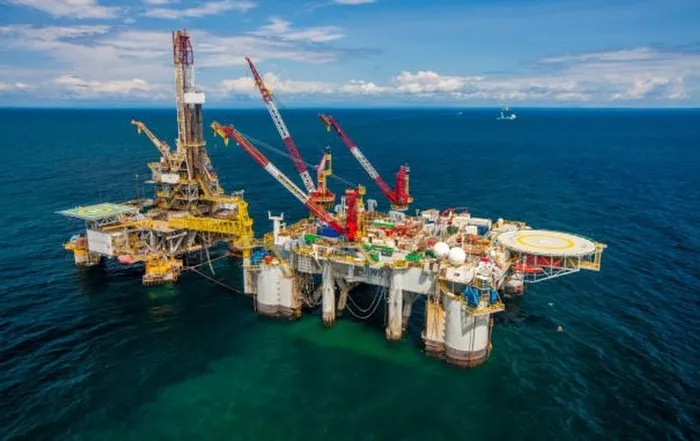
A Shell Offshore Upstream production facility in African water. Africa’s growing role in the global energy market, along with its proximity to key international markets, positions it as a critical player in the future of natural gas.
Image: Getty Images
As Africa’s gas and LNG potential continues to grow, African Energy Week: Invest in African Energies 2025 will highlight key opportunities and challenges in unlocking the continent's vast energy resources, driving economic growth and advancing energy security.
Africa’s natural gas and LNG potential is a cornerstone of the continent’s energy future. According to the African Energy Chamber's (AEC) State of African Energy 2025 Outlook Report, Africa's gas reserves could support a fourfold increase in LNG exports by 2040.
Gas-to-power initiatives offer a vital solution to the continent's electricity access challenges while also providing a pathway to monetise, underutilised gas resources. With the right investments and collaborative efforts, Africa is poised to unlock the full potential of its gas sector, driving economic growth and energy security.
Several large-scale projects are driving Africa's gas potential, with LNG exports seen as a critical part of the continent's energy future.
Africa has the capacity to increase its LNG export capacity almost fourfold by 2040, says the AEC’s report, with a projected 175 million tons of LNG per year. Currently, Africa’s LNG exports stand at around 40 million tons, suggesting massive room for growth.
Mozambique, a major growth driver for the continent's LNG sector, has the potential to achieve LNG export capacity of up to 50 million tons by 2040, though this potential has been tempered by security concerns, particularly in onshore areas.
These challenges have led companies to look toward smaller offshore floating LNG (FLNG) solutions.
For example, Eni’s Coral North FLNG project in Mozambique is being developed incrementally as an offshore solution, though it remains smaller in scale than the onshore alternatives.
Other key projects include significant developments in Senegal and Mauritania. These nations are set to become major LNG exporters, with developments such as the Greater Tortue Ahmeyim (GTA) project – co-led by bp and international partners – expected to play a pivotal role in the continent's LNG growth, especially as it progresses to its second phase.
While the path to realising Africa’s gas and LNG potential presents challenges, there are significant opportunities for growth.
Developing both domestic and export markets is crucial to fully unlocking the continent's gas resources. Large-scale pipeline projects, such as the West African Gas Pipeline and Trans-Saharan Gas Pipeline, could play a vital role in connecting African gas to additional markets, including Europe.
Although these projects face financing and political complexities, successful collaboration and strategic investments can pave the way for their advancement, unlocking new economic opportunities and expanding Africa’s energy reach.
Security remains one of the most significant risks, particularly in regions like Mozambique, where insurgencies have already disrupted major projects.
While offshore FLNG projects, such as Coral North, provide a more flexible and secure option, they also come with higher capital costs and reduced production capacity compared to onshore facilities.
Africa’s growing role in the global energy market, along with its proximity to key international markets, positions it as a critical player in the future of natural gas.
The Chamber’s report emphasises that Africa’s gas potential can be fully realised with the right investments, including de-risking strategies, improved regulatory frameworks, and greater collaboration among governments, industry stakeholders, and financiers.
This year’s African Energy Week (AEW): Invest in African Energies conference provides a platform for addressing challenges and opportunities within Africa’s gas and LNG sector and discussing strategies for unlocking Africa’s full energy potential. - Africa Energy Chamber